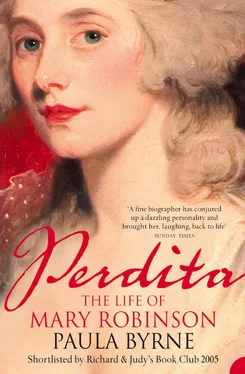1 ...7 8 9 11 12 13 ...31 Garrick’s knowledge of Mary’s marriage put increasing pressure on Robinson to make the union public. Every day that passed with a disavowal from him put Hester under increasing strain, and Mary’s reputation at greater risk. She could fall pregnant at any time, a plight that Garrick and George Colman the Elder had exploited in their popular comedy of 1766 The Clandestine Marriage . In this play, the lovely young heroine Fanny Sterling is persuaded by her new husband, against her better judgement, to keep her clandestine marriage secret, even though she is heavily pregnant. Despite her condition, she is pursued by many suitors, especially the lecherous aristocrat Lord Ogleby. Mary hints at a similar dilemma in her Memoirs , though it was her mother who was furious with Thomas: ‘The reputation of a darling child, she alleged, was at stake; and though during a few weeks the world might have been kept in ignorance of my marriage, some circumstances that had transpired now rendered an immediate disclosure absolutely necessary.’ 2 There is, however, no evidence that Mary was indeed pregnant at this time. Her daughter was born a full year later.
Perhaps this was an example of Mary’s penchant in her Memoirs for conflating fact and fiction, drawing upon a literary cliché of secret unions and swollen stomachs. She was writing with the memory of having drawn attention from the press for playing the part of the pregnant Fanny Sterling in The Clandestine Marriage whilst she herself was heavily pregnant with her second child. Another possibility is, of course, that Mary and her mother used a feigned pregnancy as a final card to force Thomas’s hand and frighten him into submission. If that was the trick, it seems to have worked: Hester confronted her son-in-law and demanded that he make the marriage public before Mary’s reputation was irrevocably damaged.
Finding Hester inexorable, Robinson resolved to leave for South Wales to avow his marriage and present his young bride to his ‘uncle’ – he still stubbornly disputed the fact of his illegitimacy, though his secret was now out. Hester insisted on travelling with the couple as far as Bristol, ostensibly in order to visit her old friends in the city, but no doubt also to keep an eye on developments. In the absence of her husband, she was determined to protect her daughter’s honour. The journey to Bristol was enlivened by a stopover in which they visited the Oxford colleges and took a guided tour of Blenheim Palace – ‘with the hope of soothing my mother’s resentment, and exhilarating my spirits, which were now perpetually dejected’. 3
Robinson went on alone from Bristol to the family seat in Tregunter, Wales. He assured his wife that he would be smoothing the way for her eventual cordial reception at Tregunter House, but, in truth, neither was at all confident that Thomas Harris would sanction the union. On the surface, it seemed a very peculiar marriage. Thomas and Mary had now been married for six months without living together under the same roof. Now Mary was being left again so that Robinson could persuade his father, from whom he had been estranged for some time, to give his blessing to a marriage without prospects or money. It was an inauspicious start to domestic life. Still, they both wanted money and status, and wanted to live well. Mary was prepared to let him go to do his best to win round his father. She insists that although she did not feel overwhelmed with love, she was nevertheless attached ‘to the interest as well as to the person of my husband’. 4 Though she later came to despise him, she was aware of his qualities, his easy-going temperament and affability.
Nor was she willing to sit and mope whilst their future hung in the balance. She was gratified by the homecoming she received at Bristol. News had spread that Mary Darby had made a good marriage ‘to a young man of considerable expectations’ and she was once again ‘received as the daughter of Mr Darby’. Given her father’s marital infidelity and her husband’s true circumstances, she saw the irony in the way that she was deriving respectability from her status as a wife and a daughter. She was struck by the numerous invitations she now received, in stark contrast to the time when she and her mother had left Bristol in humiliation: ‘I found that fortune was, to common minds, a never-failing passport.’ 5 She was in a sense returning in triumph, restoring her mother and herself to the respectability that had been lost when Nicholas Darby walked out. Friends who now greeted Hester and Mary warmly had turned their backs when they had most needed friendship. They could turn again. Mary rarely forgot a social slight, and felt it keenly if someone wronged her – a reaction which perhaps stemmed from those Bristol years when the family had endured social ostracism.
Her return to the place of her birth affected her deeply. She took a solitary walk back to the scenes of her childhood: the schoolhouse, the green, the tombs of her ancestors. In the minster she once more crept under the wings of the huge brass eagle in the middle aisle, just as she had done as a child. ‘Language cannot describe the sort of sensation’ which she felt when she suddenly heard the peal of the organ ringing out as it had in her youth. But now the family home was a ruin: ‘The nursery windows were dim, and shattered; the house was sinking to decay.’ She remembered how she had walked in the cloisters that linked her old home to the minster: ‘“Here,” said I, “did my infant feet pace to and fro” … On those dark and winding steps, did I sit and listen to the full-toned organ, the loud anthem, and the bell, which called the parishioners to prayer.’ 6 As she re-entered the cathedral, she read and reread the monumental inscriptions, finding the grave of the actor William Powell, whose Lear had been her first experience of theatre. And she dropped a tear on the stone tablet that commemorated an old family friend. As so often in the Memoirs , this account is embellished with many a literary flourish, but there is no reason to doubt that when Mary returned to Bristol as Mrs Robinson she must have felt that her childhood was well and truly over, her innocence lost.
Her melancholy was no doubt exacerbated by the uncertainty over her future. Everything depended upon Thomas Harris’s generosity. Perhaps she even feared that her husband would abscond. Hope returned when Robinson sent a letter from Tregunter relating that his ‘ uncle seemed disposed to act handsomely’. Mary learned that at first Robinson was too frightened to tell his father that he was already married, but upon revealing the truth, Harris expressed the hope that she was neither too young nor too beautiful, since ‘beauty, without money, is but a dangerous sort of portion’. Still, Harris had grudgingly accepted the inevitable: ‘If the thing is done, it cannot be undone.’ 7 He agreed to a visit. Robinson duly wrote with the news, instructing Mary to obtain funds for the journey by requesting a loan from one of his friends back in London – a man she had sometimes seen in his company.
‘One or two letters passed on this subject,’ she writes in the Memoirs . And then her husband returned in order to escort her to Wales. The man to whom she had written was the notorious John King, generally known as ‘Jew’ King, a young and ambitious money-broker. In the Memoirs Mary claims disingenuously that she was ‘an entire stranger to the transaction which rendered him the temporary source of my husband’s finances’. 8 She represents herself as the very picture of innocence and passivity. The emphasis on her melancholy mood and her recollections of childhood as she waited in Bristol draws the reader away from any thought of her possible implication in her new husband’s messy financial affairs.
Читать дальше












